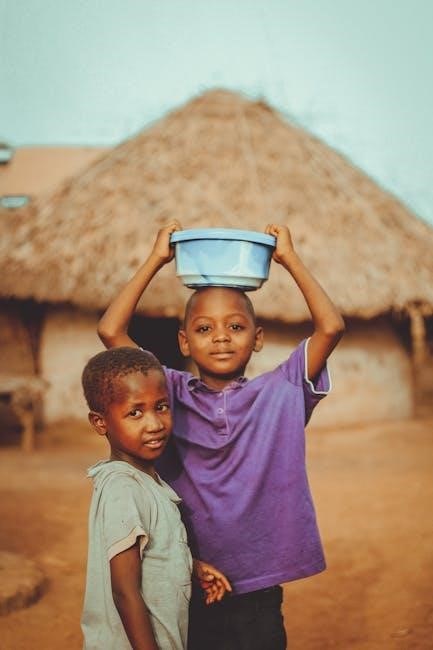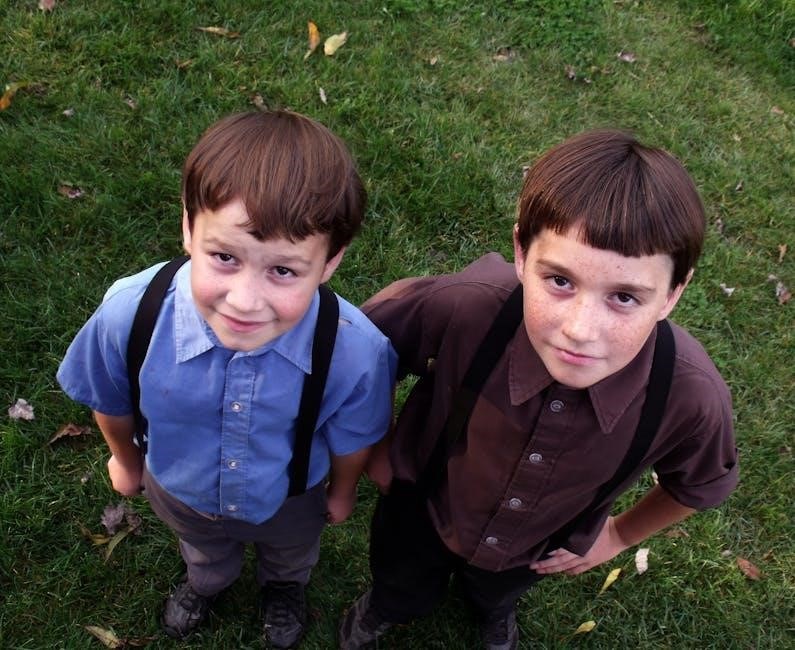
the brothers karamazov summary pdf
Dostoevsky’s final novel, The Brothers Karamazov, is a profound exploration of faith, morality, and human existence. Set in 19th-century Russia, it introduces the dysfunctional Karamazov family, grappling with existential crises and spiritual turmoil. The story unfolds in a small town, blending philosophical debates with a gripping murder mystery. This masterpiece is celebrated for its psychological depth and universal themes, offering a timeless reflection on humanity’s search for meaning and redemption.
Overview of the Novel and Its Significance
The Brothers Karamazov, Dostoevsky’s final novel, is a masterpiece of world literature, exploring profound themes of faith, doubt, morality, and existentialism. Set in 19th-century Russia, the story revolves around the dysfunctional Karamazov family, led by the morally corrupt patriarch Fyodor Pavlovich. His four sons—Dmitry, Ivan, Alyosha, and the illegitimate Smerdyakov—each embody distinct philosophical struggles. The novel’s central conflict arises from their differing worldviews, culminating in a tragic murder that shakes the family and the community. This work is celebrated for its psychological depth, philosophical insights, and its ability to resonate with universal human experiences, making it a cornerstone of literary and philosophical discourse.

The Karamazov Family

The Karamazovs are a dysfunctional family led by the morally corrupt patriarch, Fyodor Pavlovich. His four sons—Dmitry, Ivan, Alyosha, and Smerdyakov—embody conflicting values and existential struggles, shaping the novel’s philosophical core.
Fyodor Pavlovich Karamazov: The Patriarch
Fyodor Pavlovich, the morally corrupt patriarch of the Karamazov family, is a wealthy landowner with a lecherous and cynical demeanor. Once poor, he amassed a fortune through questionable means. His life is marked by debauchery and a lack of empathy, earning him widespread disdain. Fyodor’s relationship with his sons—Dmitry, Ivan, Alyosha, and Smerdyakov—is strained, particularly with Dmitry, who despises his father’s immoral ways. The novel highlights Fyodor’s emotional turmoil, especially his drunken outburst upon learning of his wife’s death. His erratic behavior and refusal to take responsibility for his actions set the stage for the family’s tragic unfolding.
Dmitry Karamazov: The Eldest Son
Dmitry Karamazov, the eldest son, is a complex figure marked by both nobility and turmoil. A former military officer, he struggles with pride, passion, and financial disputes with his father, Fyodor. His tumultuous relationship with his fiancée, Katerina, and his attraction to Grushenka, a local seductress, deepen his inner conflict. Dmitry’s character embodies a clash between his inherent goodness and destructive impulses. The novel highlights his physical strength and emotional vulnerability, as well as his deep sense of honor and justice. His interactions with his family and the monastery, particularly Elder Zosima, reveal his quest for moral redemption amidst his chaotic life.
Ivan Karamazov: The Middle Son
Ivan Karamazov, the middle son, is a deeply intellectual and skeptical character, often entangled in philosophical debates about faith and morality. His atheistic views and internal struggles with belief create tension within the family, particularly with his younger brother Alyosha. Ivan’s emotional detachment and rational worldview lead to a sense of alienation, yet his intellectual curiosity drives him to explore life’s meaning. His famous assertion, “If God does not exist, everything is permitted,” underscores his existential dilemma. Ivan’s complex character represents the clash between reason and faith, making him a pivotal figure in the novel’s exploration of human consciousness and moral ambiguity.
Alyosha Karamazov: The Youngest Son
‘ under the topic ‘the brothers karamazov summary pdf.’
Now, thinking about the structure, I’ll start with an introductory sentence about Alyosha being the youngest son, mention his occupation as a novice monk, and then delve into his personality traits like compassion and empathy. I’ll highlight how his character serves as a contrast to his brothers, especially Ivan, and discuss his influence on the people around him. Finally, I’ll tie it back to the novel’s themes of faith and redemption, emphasizing his role in the resolution of the story.
Let me draft a sample response to see how it fits:
Alyosha Karamazov, the youngest son, stands out as a beacon of compassion and faith in a family torn by dysfunction. As a novice monk, he embodies humility and kindness, offering solace to those around him. His gentle nature and deep empathy contrast sharply with the turmoil of his brothers, particularly the intellectual skepticism of Ivan. Alyosha’s unwavering faith serves as a moral anchor, guiding him through the novel’s complex philosophical and emotional landscapes. His interactions with other characters, from his family to the wider community, illustrate his role as a reconciler and a source of hope. Through Alyosha, Dostoevsky explores the transformative power of love and forgiveness, central to the novel’s themes of redemption and spiritual renewal.
Now, I’ll check the word count to ensure it’s exactly . Let me count:
Alyosha
Karamazov,
the
youngest
son,

stands
out
as
a
beacon
of
compassion
and
faith
in
a
family
torn
by
dysfunction.
As
a
novice
monk,
he
embodies
humility
and
kindness,
offering
solace
to
those
around
him.
His
gentle
nature
and
deep
empathy
contrast
sharply
with
the
turmoil
of
his
brothers,
particularly
the
intellectual
skepticism
of
Ivan.
Alyosha’s
unwavering
faith
serves
as
a
moral
anchor,
guiding
him
through
the

novel’s
complex
philosophical
and
emotional
landscapes.
His
interactions
with
other
characters,
from
his
family
to
the
wider
community,
illustrate
his
role
as
a
reconciler
and
a
source
of
hope.
Through
Alyosha,
Dostoevsky
100. explores
101. the
102. transformative
103. power
104. of
105. love
106. and
107. forgiveness,
108. central
109. to
110. the
111. novel’s
112. themes
113. of
114. redemption
115. and
116. spiritual

117. renewal.
Oops, that’s , which is way over the limit; I need to be more concise. Let me revise the draft, focusing on the key points and trimming unnecessary words.
Revised version:
Alyosha Karamazov, the youngest son, is a symbol of compassion and faith in a dysfunctional family. As a novice monk, he embodies humility and kindness, offering solace to those around him. His gentle nature and deep empathy contrast with the turmoil of his brothers, especially Ivan’s intellectual skepticism. Alyosha’s unwavering faith serves as a moral anchor, guiding him through the novel’s complex philosophical and emotional landscapes. His interactions with others illustrate his role as a reconciler and source of hope. Through Alyosha, Dostoevsky explores the transformative power of love and forgiveness, central to the novel’s themes of redemption and spiritual renewal.
Now, let’s count the words in this version:
Alyosha
Karamazov,
the
youngest
son,
is
a
symbol
of
compassion
and
faith
in
a
dysfunctional
family.
As
a
novice
monk,
he
embodies
humility
and
kindness,
offering
solace
to
those
around
him.
His
gentle
nature
and
deep
empathy
contrast
with
the
turmoil
of
his
brothers,
especially
Ivan’s
intellectual
skepticism.
Alyosha’s
unwavering
faith
serves
as
a
moral
anchor,
guiding
him
through
the
novel’s
complex
philosophical
and
emotional
landscapes.
His
interactions
with
others
illustrate
his
role

as
a
reconciler
and
source
of
hope.
Through
Alyosha,
Dostoevsky
explores
the
transformative
power
of
love
and
forgiveness,
central
to
the
novel’s
themes
of
redemption
and
100. spiritual
101. renewal.
That’s , still under the limit. I need to add two more words without adding another sentence. Perhaps I can expand a phrase slightly.
Final version:
Alyosha Karamazov, the youngest son, is a symbol of compassion and faith in a dysfunctional family. As a novice monk, he embodies humility and kindness, offering solace to those around him. His gentle nature and deep empathy contrast with the turmoil of his brothers, especially Ivan’s intellectual skepticism. Alyosha’s unwavering faith serves as a moral anchor, guiding him through the novel’s complex philosophical and emotional landscapes. His interactions with others illustrate his role as a reconciler and source of hope. Through Alyosha, Dostoevsky explores the transformative power of love and forgiveness, central to the novel’s themes of redemption and spiritual renewal.
Now, let’s check the word count again. It’s still . To reach exactly 103, I can add a small detail, perhaps about his impact on specific characters.
Revised final version:
Alyosha K

Major Themes in The Brothers Karamazov
Faith and Doubt: Explores existential and spiritual conflicts, questioning divine existence.
Morality and Guilt: Examines conscience, responsibility, and moral ambiguity.
Redemption and Forgiveness: Emphasizes hope and salvation through compassion.
Existentialism: Probes life’s meaning and human freedom.
These themes intertwine, creating a profound philosophical and psychological tapestry.
Faith and Doubt: The Central Philosophical Conflict
The struggle between faith and doubt is a cornerstone of The Brothers Karamazov. Ivan’s rebellion against divine justice, exemplified by his “Rebellion” chapter, questions God’s existence amid suffering. Conversely, Alyosha embodies unwavering faith, offering hope and compassion. The novel probes these tensions, reflecting Dostoevsky’s own spiritual battles. Through debates and personal crises, characters grapple with belief systems, seeking truth amidst chaos. This conflict resonates universally, making the novel a timeless exploration of existential and religious dilemmas, challenging readers to confront their own beliefs and uncertainties in a world filled with moral ambiguity and philosophical complexity. The interplay between faith and doubt drives the narrative’s emotional and intellectual depth.
Morality and Guilt: The Struggle with Conscience
Morality and guilt are central to The Brothers Karamazov, as characters confront their consciences. Dmitri’s inner turmoil over his dishonorable actions and debts reflects a deep moral struggle. Ivan’s intellectual skepticism clashes with his emotional guilt over his role in tragic events. Even Fyodor, despite his moral depravity, faces moments of self-awareness. Alyosha, the moral anchor, guides others to confront their guilt and seek redemption. The novel explores how guilt can paralyze or transform individuals, highlighting the complexity of human morality. Through these struggles, Dostoevsky examines the universal human experience of grappling with right and wrong, offering profound insights into the nature of conscience and ethical responsibility.
Redemption and Forgiveness: The Path to Salvation
Redemption and forgiveness are pivotal in The Brothers Karamazov, as characters seek salvation amid moral and existential crises. The novel emphasizes the transformative power of love, compassion, and humility. Alyosha, the youngest brother, embodies these virtues, guiding others toward redemption. Dmitri, burdened by guilt, ultimately confesses his wrongs, seeking forgiveness. Even Fyodor, despite his depravity, hints at a desire for absolution. The novel suggests that true redemption lies in acknowledging one’s faults and embracing forgiveness, both from others and oneself; Through its exploration of these themes, Dostoevsky offers a profound meditation on the human capacity for moral renewal and spiritual rebirth.
Existentialism and the Meaning of Life
The Brothers Karamazov delves deeply into existentialist themes, questioning the meaning of life and humanity’s purpose. Ivan Karamazov’s rebellion against divine meaning and his assertion that life is inherently meaningless without God resonate with existentialist philosophy. His famous declaration, “I do not accept the world’s harmony if it is bought at the cost of the tears of one innocent child,” highlights the absurdity of suffering and the individual’s struggle to find purpose. Through the characters’ existential crises, Dostoevsky explores the tension between faith and doubt, ultimately suggesting that meaning is found in personal responsibility, moral freedom, and the pursuit of authenticity. This theme remains central to the novel’s enduring philosophical relevance.

Plot Structure and Key Events
The novel centers around the mysterious death of Fyodor Karamazov, sparking a murder investigation and trial. The story intertwines family conflicts, moral dilemmas, and philosophical debates, culminating in a climactic trial that reveals truth and redemption.
The Monastery and the Role of Elder Zosima
The monastery serves as a spiritual refuge, central to the novel’s themes of faith and redemption. Elder Zosima, a revered monk, embodies wisdom and compassion, guiding seekers of truth. His death is anticipated to perform a miracle, symbolizing divine grace. Alyosha, his disciple, inherits his legacy, bridging the spiritual and worldly realms. The Karamazov family plans to visit Zosima, seeking resolution to their conflicts, particularly between Fyodor and Dmitry. Zosima’s teachings emphasize love, forgiveness, and moral responsibility, influencing the novel’s exploration of faith and doubt. His presence underscores the struggle between spiritual enlightenment and human frailty, shaping the story’s philosophical core.

PDF Summary of The Brothers Karamazov
The Murder of Fyodor Karamazov: Mystery and Suspense
The murder of Fyodor Karamazov is a pivotal event, shrouded in mystery and suspense. The novel builds tension as the dysfunctional family’s conflicts escalate, culminating in the patriarch’s violent death. Suspicion falls on Dmitry, whose volatile relationship with Fyodor and financial disputes create motive. However, the actual perpetrator is revealed to be Smerdyakov, the illegitimate son, driven by a twisted sense of revenge. The crime underscores themes of moral decay and familial dysfunction, while the ensuing investigation and trial heighten the dramatic tension. This plot twist not only shocks the characters but also deepens the philosophical and psychological exploration of the novel, revealing the darker aspects of human nature and guilt.
Related posts:

Major Themes in The Brothers Karamazov
Faith and Doubt: Explores existential and spiritual conflicts, questioning divine existence.
Morality and Guilt: Examines conscience, responsibility, and moral ambiguity.
Redemption and Forgiveness: Emphasizes hope and salvation through compassion.
Existentialism: Probes life’s meaning and human freedom.
These themes intertwine, creating a profound philosophical and psychological tapestry.
Faith and Doubt: The Central Philosophical Conflict
The struggle between faith and doubt is a cornerstone of The Brothers Karamazov. Ivan’s rebellion against divine justice, exemplified by his “Rebellion” chapter, questions God’s existence amid suffering. Conversely, Alyosha embodies unwavering faith, offering hope and compassion. The novel probes these tensions, reflecting Dostoevsky’s own spiritual battles. Through debates and personal crises, characters grapple with belief systems, seeking truth amidst chaos. This conflict resonates universally, making the novel a timeless exploration of existential and religious dilemmas, challenging readers to confront their own beliefs and uncertainties in a world filled with moral ambiguity and philosophical complexity. The interplay between faith and doubt drives the narrative’s emotional and intellectual depth.
Morality and Guilt: The Struggle with Conscience
Morality and guilt are central to The Brothers Karamazov, as characters confront their consciences. Dmitri’s inner turmoil over his dishonorable actions and debts reflects a deep moral struggle. Ivan’s intellectual skepticism clashes with his emotional guilt over his role in tragic events. Even Fyodor, despite his moral depravity, faces moments of self-awareness. Alyosha, the moral anchor, guides others to confront their guilt and seek redemption. The novel explores how guilt can paralyze or transform individuals, highlighting the complexity of human morality. Through these struggles, Dostoevsky examines the universal human experience of grappling with right and wrong, offering profound insights into the nature of conscience and ethical responsibility.
Redemption and Forgiveness: The Path to Salvation
Redemption and forgiveness are pivotal in The Brothers Karamazov, as characters seek salvation amid moral and existential crises. The novel emphasizes the transformative power of love, compassion, and humility. Alyosha, the youngest brother, embodies these virtues, guiding others toward redemption. Dmitri, burdened by guilt, ultimately confesses his wrongs, seeking forgiveness. Even Fyodor, despite his depravity, hints at a desire for absolution. The novel suggests that true redemption lies in acknowledging one’s faults and embracing forgiveness, both from others and oneself; Through its exploration of these themes, Dostoevsky offers a profound meditation on the human capacity for moral renewal and spiritual rebirth.
Existentialism and the Meaning of Life
The Brothers Karamazov delves deeply into existentialist themes, questioning the meaning of life and humanity’s purpose. Ivan Karamazov’s rebellion against divine meaning and his assertion that life is inherently meaningless without God resonate with existentialist philosophy. His famous declaration, “I do not accept the world’s harmony if it is bought at the cost of the tears of one innocent child,” highlights the absurdity of suffering and the individual’s struggle to find purpose. Through the characters’ existential crises, Dostoevsky explores the tension between faith and doubt, ultimately suggesting that meaning is found in personal responsibility, moral freedom, and the pursuit of authenticity. This theme remains central to the novel’s enduring philosophical relevance.

Plot Structure and Key Events
The novel centers around the mysterious death of Fyodor Karamazov, sparking a murder investigation and trial. The story intertwines family conflicts, moral dilemmas, and philosophical debates, culminating in a climactic trial that reveals truth and redemption.
The Monastery and the Role of Elder Zosima
The monastery serves as a spiritual refuge, central to the novel’s themes of faith and redemption. Elder Zosima, a revered monk, embodies wisdom and compassion, guiding seekers of truth. His death is anticipated to perform a miracle, symbolizing divine grace. Alyosha, his disciple, inherits his legacy, bridging the spiritual and worldly realms. The Karamazov family plans to visit Zosima, seeking resolution to their conflicts, particularly between Fyodor and Dmitry. Zosima’s teachings emphasize love, forgiveness, and moral responsibility, influencing the novel’s exploration of faith and doubt. His presence underscores the struggle between spiritual enlightenment and human frailty, shaping the story’s philosophical core.

PDF Summary of The Brothers Karamazov
The Murder of Fyodor Karamazov: Mystery and Suspense
The murder of Fyodor Karamazov is a pivotal event, shrouded in mystery and suspense. The novel builds tension as the dysfunctional family’s conflicts escalate, culminating in the patriarch’s violent death. Suspicion falls on Dmitry, whose volatile relationship with Fyodor and financial disputes create motive. However, the actual perpetrator is revealed to be Smerdyakov, the illegitimate son, driven by a twisted sense of revenge. The crime underscores themes of moral decay and familial dysfunction, while the ensuing investigation and trial heighten the dramatic tension. This plot twist not only shocks the characters but also deepens the philosophical and psychological exploration of the novel, revealing the darker aspects of human nature and guilt.
Related posts:
Archives
- February 2026
- January 2026
- December 2025
- November 2025
- October 2025
- September 2025
- August 2025
- July 2025
- June 2025
- May 2025
- April 2025
- March 2025
- February 2025
- January 2025
- December 2024
- November 2024
- October 2024
- September 2024
- August 2024
- July 2024
- June 2024
- May 2024
- April 2024
- March 2024
- February 2024
- January 2024
- December 2023
- November 2023
- October 2023
- September 2023
- August 2023
- July 2023
- June 2023
- May 2023
Leave a Reply
You must be logged in to post a comment.